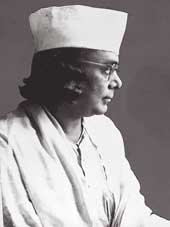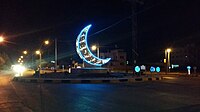O Mon Romzaner Oi Rozar Sheshe
| "O Mon Romzaner Oi Rozar Sheshe Elo Khushir Eid" | |
|---|---|
 Kazi Nazrul Islam, composer of the song | |
| Song | |
| Language | Bengali |
| English title | Oh, at the end of the fasting of Ramadan, Eid has arrived! |
| Published | 1931 |
| Genre | Nazrul Geeti |
| Songwriter(s) | Kazi Nazrul Islam |
| Composer(s) | Kazi Nazrul Islam |
| Lyricist(s) | Kazi Nazrul Islam |
O Môn Rômzaner Oi Rozar Sheshe Elo Khushir Eid (Template:Lang-bn) is the most notable Bengali Eid-ul-Fitr song, written by Kazi Nazrul Islam, the national poet of Bangladesh. It is a very common tune heard in Bengali households around the world. The song was written and composed at the request of Nazrul's disciple, Abbasuddin Ahmed in 1931.[1] It has been covered by many artists around the world. The song is written on the end of the period of fasting and the Bengali celebration of Eid-ul-Fitr.[2] This was regarded by his contemporaries as a significant achievement, as Bengali Muslims had been strongly averse to devotional music.[3]
Bengali lyrics, romanization and English translation
Lyrics and romanization:
ও মন রমজানের ঐ রোজার শেষে এলো খুশির ঈদ,
তুই আপনাকে আজ বিলিয়ে দে, শোন আসমানী তাগিদ।
তোর সোনা-দানা, বালাখানা সব রাহে লিল্লাহ
দে যাকাত, মুর্দা মুসলিমের আজ ভাঙাইতে নিঁদ,
ও মন রমজানের ঐ রোজার শেষে এলো খুশির ঈদ।আজ পড়বি ঈদের নামাজ রে মন সেই সে ঈদগাহে,
যে ময়দানে সব গাজী মুসলিম হয়েছে শহীদ।
ও মন রমজানের ঐ রোজার শেষে এলো খুশির ঈদ।আজ ভুলে যা তোর দোস্ত-দুশমন, হাত মেলাও হাতে,
তোর প্রেম দিয়ে কর বিশ্ব নিখিল ইসলামে মুরিদ।
ও মন রমজানের ঐ রোজার শেষে এলো খুশির ঈদ।যারা জীবন ভরে রাখছে রোজা, নিত্য উপবাসী,
সেই গরীব ইয়াতীম মিসকিনে দে যা কিছু মুফিদ,
ও মন রমজানের ঐ রোজার শেষে এলো খুশির ঈদ।
আপনাকে আজ বিলিয়ে দে শোন আসমানী তাগিদ।ঢাল হৃদয়ের তশতরীতে শিরনি তৌহিদের, তোর দাওয়াত কবুল করবেন হজরত হয় মনে উম্মীদ।
ও মন রমজানের ঐ রোজার শেষে এলো খুশির ঈদ।তোরে মারল' ছুঁড়ে জীবন জুড়ে ইট পাথর যারা,
সেই পাথর দিয়ে তোলরে গড়ে প্রেমেরই মসজিদ।
ও মন রমজানের ঐ রোজার শেষে এলো খুশির ঈদ,
আপনাকে আজ বিলিয়ে দে শোন আসমানী তাগিদ।Ō mana ramajānēra ai rōjāra śēṣē ēlō khuśira īda,
tu'i āpanākē āja biliẏē dē, śōna āsamānī tāgida.
Tōra sōnā-dānā, bālākhānā saba rāhē lillāha dē yākāta, murdā musalimēra āja bhāṅā'itē nim̐da, ō mana ramajānēra ai rōjāra śēṣē ēlō khuśira īda.Āja paṛabi īdēra nāmāja rē mana sē'i sē īdagāhē, yē maẏadānē saba gājī musalima haẏēchē śahīda.
Ō mon ramajānēra ai rōjāra śēṣē ēlō khuśira īda.Āja bhulē yā tōra dōsta-duśamana, hāta mēlā'ō hātē, tōra prēma diẏē kara biśba nikhila isalāmē murida. Ō mana ramajānēra ai rōjāra śēṣē ēlō khuśira īda.
Yārā jībana bharē rākhachē rōjā, nitya upabāsī, sē'i garība iẏātīma misakinē dē yā kichu muphida, ō mana ramajānēra ai rōjāra śēṣē ēlō khuśira īda.Āpanākē āja biliẏē dē śōna āsamānī tāgida.
Ḍhāla hr̥daẏēra taśatarītē śirani tauhidēra, tōra dā'ōẏāta kabula karabēna hajarata haẏa manē um'mīda. Ō mana ramajānēra ai rōjāra śēṣē ēlō khuśira īda.
Tōrē mārala' chum̐ṛē jībana juṛē iṭa pāthara yārā, sē'i pāthara diẏē tōlarē gaṛē prēmēra'i masajida.
Ō mana ramajānēra ai rōjāra śēṣē ēlō khuśira īda, āpanākē āja biliẏē dē śōna āsamānī tāgida.
Translation:
O heart, happy Eid came at the end of that Ramadan fast,
Give yourself away today, listen to the heavenly exhortation.
Your gold-beads, bracelets,
All the way to Lillah,
Give zakat,
To wake up the dead Muslim today,
O mind, happy Eid came at the end of that Ramadan fast.
Today I will read Eid prayers, o my heart, in that Eidgah,
The ground on which all Ghazi Muslims have been martyred.
O heart, happy Eid came at the end of that Ramadan fast.
Forget what your friend and foe do today, shake hands,
With your love, the world is a disciple of worldwide Islam.
O heart, happy Eid came at the end of that Ramadan fast.
Those who are full of life, fasting, constantly fasting,
Give to the poor orphan miskin, whatever is beneficial,
O heart, happy Eid came at the end of that Ramadan fast,
Give yourself today,
Listen to the heavenly exhortation.
Pour the sweetness of Tauhid in the saucer of the heart,
The honourable will accept your invitation, I hope.
O mind, happy Eid came at the end of that Ramadan fast.
Those who threw bricks and stones at you all their lives,
Build a mosque of love with that stone.
O heart, happy Eid came at the end of that Ramadan fast,
Give yourself today,
Listen to the heavenly exhortation.
First recording
4 days after Nazrul wrote the poem, Abbasuddin Ahmed recorded it with his voice. Two months after, it was published on Eid day by The Gramophone Company. The song was set to the Pilu as its raga and keherwa for its tala (rhythm).[4]
References
- ^ Shams Arefin (17 July 2015). "Nazrul & O Mon Romzaner Oi Rozar Sheshe". Jugantor.
- ^ "10 key events in Kazi Nazrul's life". The Daily Star. 27 August 2015. Retrieved 26 February 2016.
- ^ Kamrunnessa Azad. 2001. Dharmiya Chetonay Nazrul. Nazrul Institute, Dhaka. 1999. pp. 173–174
- ^ ও মন রমজানের ঐ রোজার শেষে এলো খুশীর ঈদ. Nazrul Geeti (in Bengali). Archived from the original on 11 July 2016.


